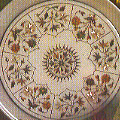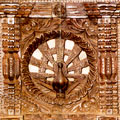Pakistan’s tradition of stone carving stretches back into history Sandstone, onyx, slate, marble and limestone are some of the varieties used by the artisans.
The earliest Arabs to arrive in Sindh brought the art of calligraphy in stone and tombs that were built between the eighth and the eighteenth century carry finely carved verses from the Quran on them. Decorative motifs and arabesque patterns were finely carved. Combined with the already popular floral motifs, like the sunflower and the lotus, these new forms produced a rich variety of designs for which a large body of stone structures in Thatta are famous.
MARBLE AND SANDSTONE
The most outstanding workmanship of the period is in marble. No visitor to the Shish Mahal in the Fort can fail to be wonder struck by the magnificent pietra dura work there. In some of the miniature niches – two and a quarter inches by one and three fourths of an inch – of half pillars one can count more than a hundred pieces of semi precious stone inlaid to form a single floral pattern. Also notable for their excellence and variety of patterns are the marble screens /jalli used for windows and the geometric and tendril designs.
In the recent past the use of sandstone in buildings declined and with it the scope for craftsmen to carve and engrave stone for architectural embellishment. However, substantial increase in the availability of marble has opened new opportunities for stone craftsmen. Although it is in the form of plain slabs that marble is mostly used in buildings, stone carvers are called in to make latticed grills and screens for newly constructed mosques.
ONYX
Pakistani craftsmen have excelled in crafting onyx in a hundred shapes. Extracted from the mountains in the NWFP and the brown hills of Balochistan, especially around Chaghai, Pakistan’s onyx is counted among the finest found anywhere in the world. It is now available in several colours and shades-off-white, deep brown, pink and jade green. Very often the veins running in a colour different than the ground give an onyx piece a natural pattern that would arouse the envy of a modern painter.


